Ex-Rockland man had rare medical setbacks after donating a kidney. Now bills are piling up
When Kevin Kiernan decided to give a kidney to a family friend, he thought he would end up like the vast majority of donors — a few pounds lighter and back to normal life in a short period of time.
But Kiernan, a former Congers resident, suffered rare and serious complications, including a hernia and hematoma that required two additional surgeries within weeks of the transplant.
Almost nine months later, Kiernan said he still has significant abdominal pain that has sidelined him from work. He has no health insurance, and the medical bills are mounting since the transplant hospital — NYU Langone Medical Center — stopped paying for his recovery in the spring. His son Zachary has started a GoFundMe campaign to help pay the bills.
"It feels like everything that could possibly go wrong has gone wrong," Kiernan, 57, said at his Waldwick home. "And I feel like I have no one to turn to after doing what I thought was right."
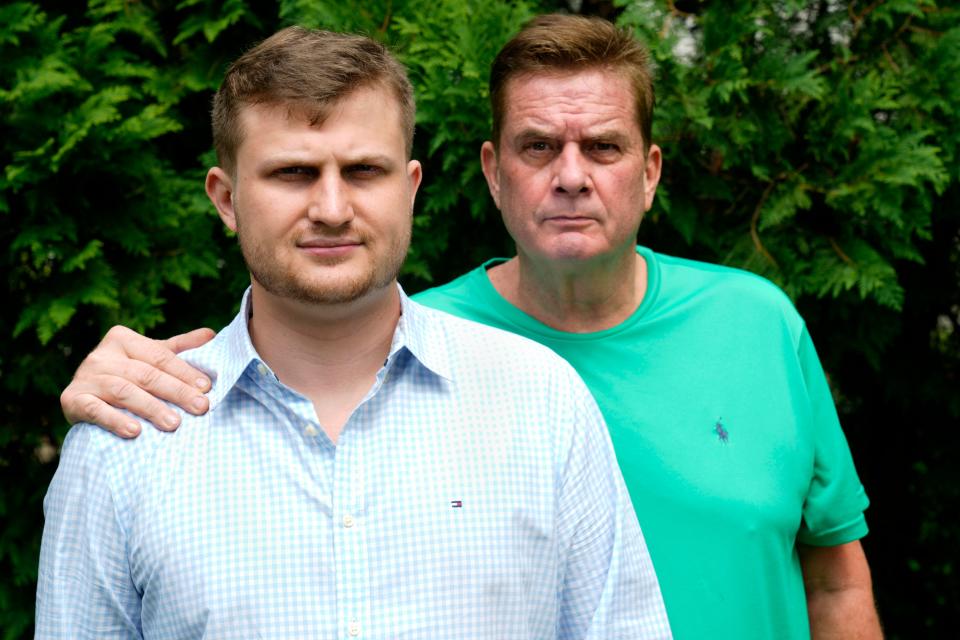
Kiernan is an outlier. Kidney transplant surgery has become so commonplace that fewer than 3% of all living donors have serious complications, according to a 2019 study. About 10% to 20% have minor complications. The rest have none and return to their daily routines usually a few weeks after surgery.
Demand outweighs supply of donors
But for those like Kiernan who do have problems, campaigns by organ advocacy groups and lawmakers are underway to try to get them financial support. That's also designed to give reassurances to potential future donors, since demand for healthy organs still outweighs supply.
While 5,000 to 7,000 people each year donate a kidney in the U.S. — including 150 to 220 in New Jersey — the National Kidney Foundation estimates that 4,000 to 5,000 Americans die each year while waiting for one.
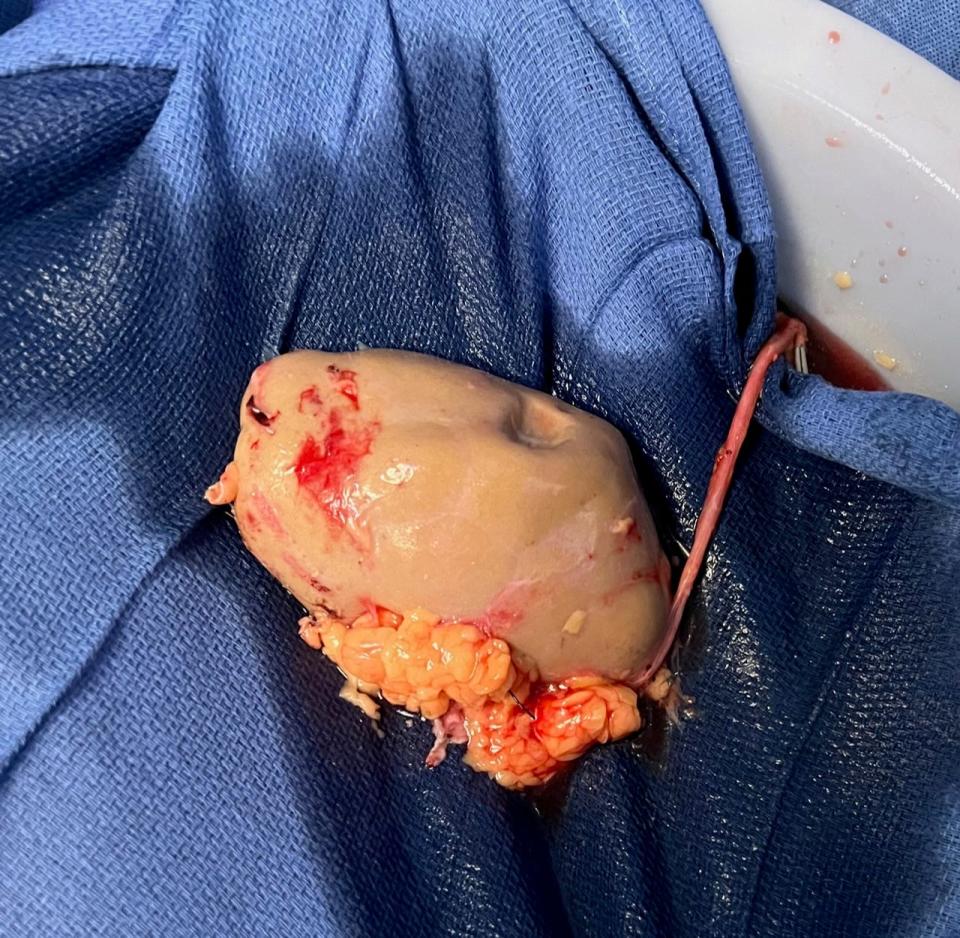
Paying for an organ donation is illegal in the U.S. The process should be "financially neutral" for donors, advocates say. Studies have shown that living kidney donors sometimes experience significant out-of-pocket expenses and may face difficulties in obtaining life and health insurance.
Push for greater donor protections
Those problems have made their way to lawmakers in statehouses across the U.S. in recent years, as advocates lobby for greater donor protection from insurance denials, loss of wages and unforeseen medical expenses such as those Kiernan is experiencing.
"Although this is rare, recovery from the surgery can sometimes take longer than the expected few weeks, causing all these costs to compound," said LaVarne Burton, president of the nonprofit American Kidney Fund. "The legislation we’ve advanced doesn’t address every issue, but it does address the most significant roadblocks to donating."
New Jersey has seen two significant bipartisan efforts in the past three years. The state is among several that have passed laws making it illegal for life, health or long-term care insurers to decline or limit coverage to an organ donor.
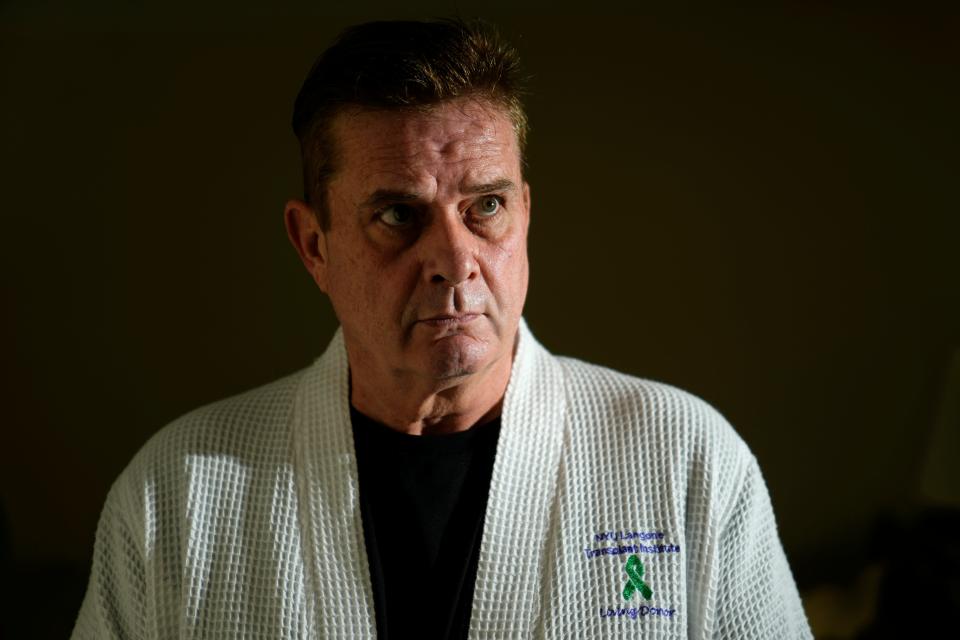
Another law signed by Gov. Phil Murphy in 2020 allows donors to deduct on their state income tax filing up to $10,000 of unreimbursed expenses for organ or bone marrow donations. Dubbed "Lindsay's Law" after a Camden County kidney donor, the measure also allows employers of donors to take a tax credit equal to 25% of the donor’s salary if they pay the worker's full salary while they are recovering.
Those measures don't go as far as the "New York State Living Donors Support Ac,t" signed by Gov. Kathy Hochul last year, which reimburses donors up to $10,000 for everything from lost wages to medical care — a move that advocates called a "groundbreaking law."
"We need to do whatever we can to make it easier for people who want to give the gift of life, and New York’s precedent-setting law will do just that," Burton said.
But Kiernan is not eligible under New York's law despite having surgery in Manhattan. Reimbursements can be made only if the donor and recipient are New York residents.
Extremely rare hernia after donating kidney
A former Villanova University football player, Kiernan was deemed healthy enough for the transplant late last year. His kidney was going to the ailing mother of a longtime friend.
The surgery was performed on Jan. 9 and was completed without any serious complications, according to surgical records reviewed by NorthJersey.com. But Kiernan felt abdominal pains not long after regaining consciousness. He was discharged two days later from NYU Langone. Kiernan, who split his time between New Jersey and Florida, went to a hotel that the recipient's family had paid for.
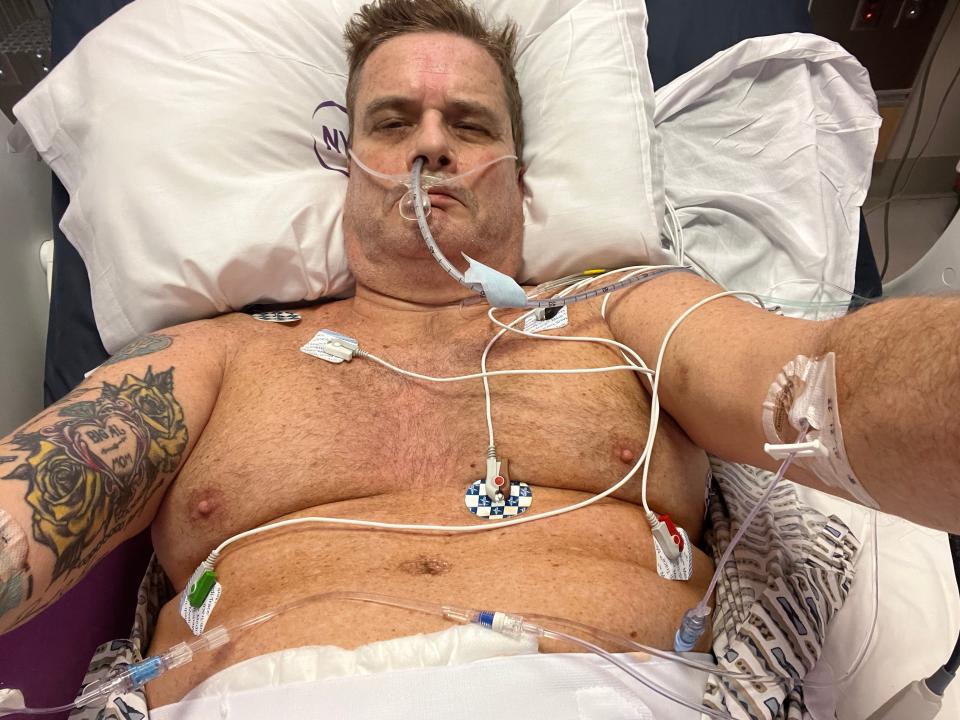
"I knew something wasn't right," Kiernan said. "I spent a week in that hotel carrying around a hernia in my hands."
Kiernan returned to NYU Langone on Jan. 20 and a few hours later was back on the operating table.
Hernias are "extremely rare" after kidney removal, but Kiernan was diagnosed that day with "fascial dehiscence," a complication from surgery that results in the need for additional surgery, according to his records. A surgeon repaired the hernia and implanted a mesh lining to keep it in place.
Hematoma and pain
Kiernan was discharged a week later, on Jan 27. But the pain returned, and soon a bruise formed on his abdomen and kept growing.
Kiernan was back on an NYU Langone operating table on Feb. 3 — his third surgery in less than a month. He had developed a hematoma — blood pooling under his skin. A surgeon drained the blood, and Kiernan was discharged three days later.
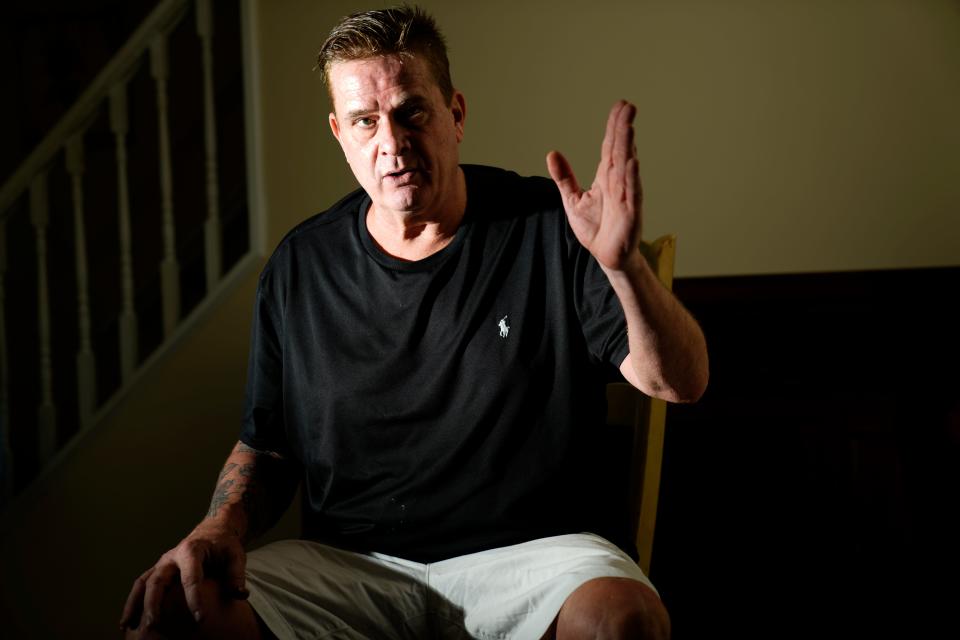
The hematoma was gone, but the pain wasn't. Kiernan said he began vomiting almost every day and had constipation and discomfort he suspects is from the mesh lining. "It feels like I have a bad itch inside me every day that I can't scratch," he said.
After a short return to NYU's emergency department, Kiernan emailed his transplant surgeon on April 11, expressing frustration that he was "uncomfortable each and every day" and feeling like a "bastard child" because he said he wasn't getting any answers from hospital personnel.
NYU would stop paying for his recovery
The next day his surgeon replied that CT scans and lab work showed that there was no "acute process going on." The surgeon also told Kiernan it was her last day at NYU. In another email hours later, she said that NYU would stop paying for his recovery because "it does not appear that these symptoms are related to organ donation. While this is not related to kidney donation, as a one-time courtesy, we will assist with the payment for this GI consult appointment only."
Story continues below photo gallery
All future tests and treatment "will need to be covered by your insurance," she wrote. Kiernan did not have health insurance and said the NYU medical team was well aware of it.
"I felt like I had been abandoned," he said. "I did something to help someone, and now no one would help me."
All health care providers are barred by federal law from sharing patient information. But Kiernan signed a waiver last week allowing NYU officials to address his complaints, which they did broadly.
"If a donor has a medical bill that they are unsure is related to the donation, our clinical team and financial counselors assist the donor," Steve Ritea, a medical center spokesman, said in a statement. "In this case, the care was completely consistent with these policies and practices."
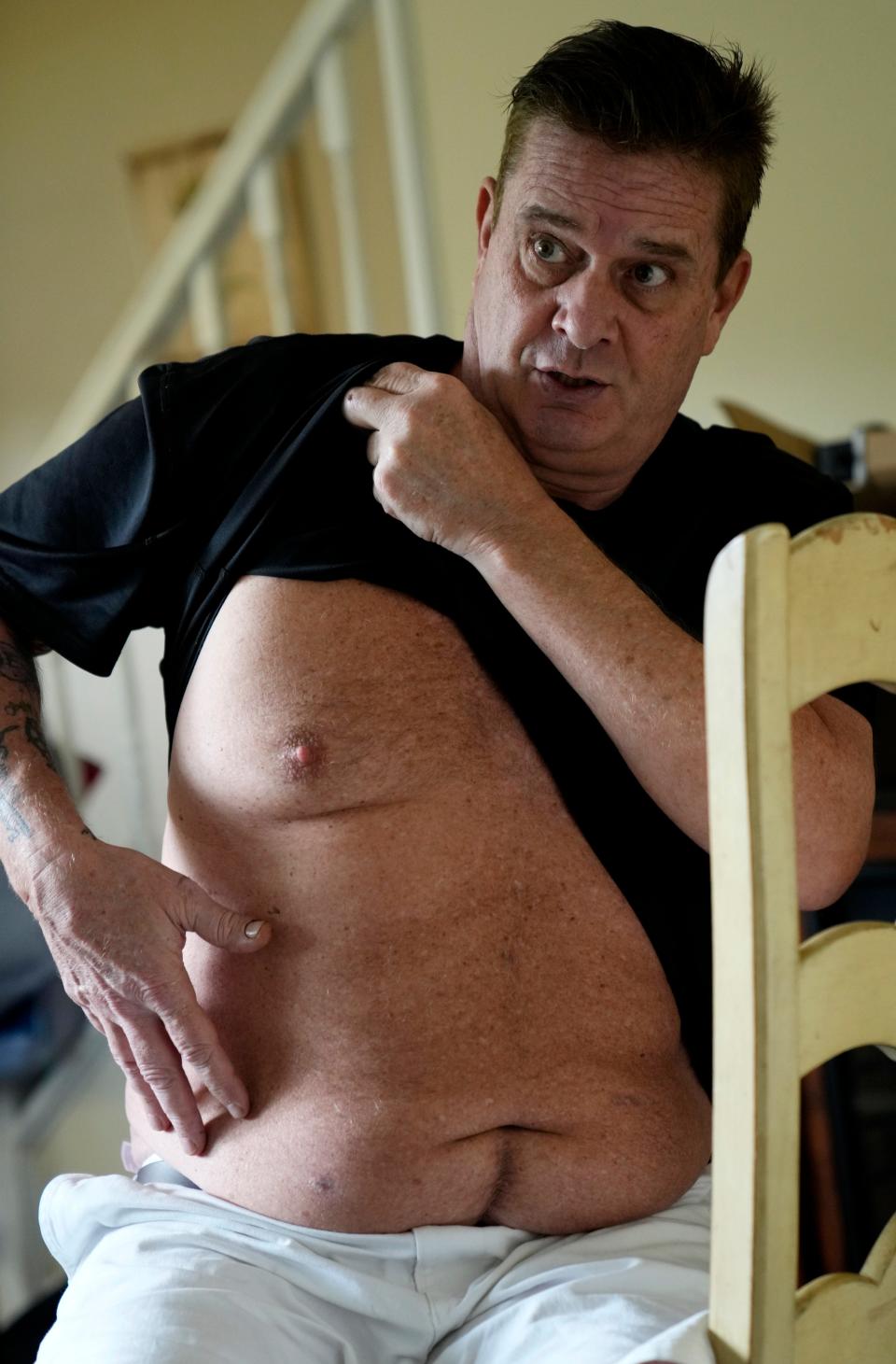
Today Kiernan said he is nearly destitute — a far cry from where he was 11 years ago as a promising entrepreneur on the television show "Shark Tank."
He can no longer work as a swimming pool operator because the job is too physical for someone in his condition. He said he has accumulated $5,000 to $7,000 in unpaid medical bills. So far the GoFundMe campaign has raised more than $3,000.
"I'd do it all again," he said of his donation. "Donating an organ is a wonderful thing. It saves lives. But nobody should have to go through this."
How safe are kidney transplants?
Any type of surgery presents risk, but kidney donations often go smoothly for donor and recipient.
Less than 3% of donors have serious complications following surgery while 10% to 20% have minor problems, according to a 2019 study.
It's a lifesaver for recipients. About 99 out of 100 who receive a living donation are still alive one year after the donation, and 86 to 90 out of 100 live for 10 years, a British study found.
How to become a kidney donor
Most living kidney donors give to a family member, a friend or someone else they know. Some also donate anonymously to a random recipient.
There are many organizations and transplant hospitals that offer guidance to donors. The National Kidney Foundation has an online guide with resources.
If you have fallen through the cracks of the health care system and want to share your story, contact Scott Fallon at fallon@northjersey.com.
This article originally appeared on NorthJersey.com: Congers man had rare setback after donating kidney. Now bills pile up

